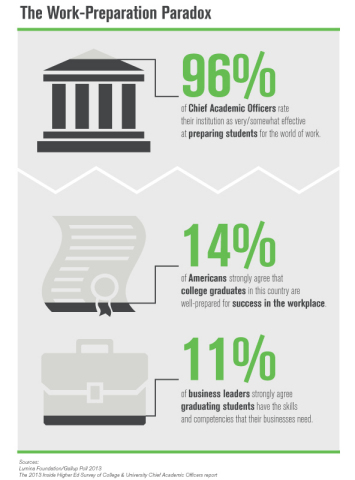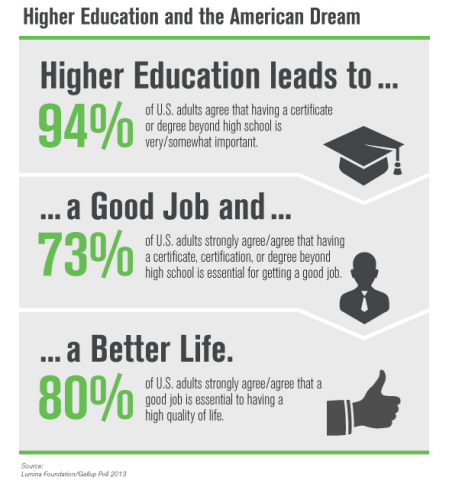WASHINGTON--(BUSINESS WIRE)--An overwhelming majority of business leaders say that even as demand for workers with degrees and other credentials is rising when it comes to making hiring decisions, a candidate’s knowledge and skills far outweigh where that candidate went to college or their major, according to new data released today. That key insight and others are part of the annual Gallup/Lumina Foundation poll that reveals reasons why America’s higher education system must be redesigned to serve the nation’s growing need for talent.
Key Finding #1:
Eighty-four percent of business leaders say that the amount of knowledge a candidate has is very important in hiring decisions.
By comparison, just nine percent of business leaders say where the candidate received their degree is very important in hiring decisions, and only 28 percent of employers say a candidate’s major is very important.
“College degrees and other credentials are more important than ever, but times have changed, and the vast majority of employers in America put acquired skills far ahead of alma mater or major when it comes to hiring,” said Jamie P. Merisotis, president and CEO of Lumina Foundation. “Whether attending a two-year, four-year or online institution, business leaders want candidates with the skills needed to produce in today’s workforce, and our higher education institutions must do more to prepare students for success.”
Key Finding #2:
The poll also found a significant perception gap between business and academic institution leaders when it comes to assessing the workforce preparedness of today’s college graduates. In a recent survey done by Gallup for Inside Higher Ed, 96% of percent of college and university chief academic officers said they are extremely or somewhat confident in their institution’s ability to prepare students for success in the workforce. By comparison, the Gallup/Lumina Foundation Poll found just 11 percent of business leaders strongly agree today’s college graduates have the skills and competencies that their business needs. As a result, 40 percent of employers say they must hire foreign-born workers due to a shortage of American workers with the skills they need.
“Students want to know their investment in a postsecondary degree or certificate will lead to a good job,” said Brandon Busteed, executive director of Gallup Education. “And employers want institutions to deliver graduates who have the skills and experience necessary for work success. But something is very wrong when you see the academic leaders of higher education giving themselves an A+ on this while business leaders give them an F. We all have a shared responsibility to fix this fast.”
Other key findings from the Gallup/Lumina Foundation poll include:
Key Finding #3:
The value of a degree, in the minds of Americans, is high and growing, but Americans recognize a need for higher education to change to better serve today’s students.
- Seventy-four percent of Americans strongly agree or agree that a postsecondary degree or credential is important to attaining a better quality of life, while 90 percent believe it’s very or somewhat important to increase the proportion of Americans with postsecondary degrees or credentials.
- Employers say that in the future a higher percentage of their jobs will require some kind of postsecondary degree or credential, and 82 percent of Americans believe that it will be even more important to have a postsecondary degree or credential to get a good job in the future.
- However, 89 percent of Americans report that higher education institutions need to change to better serve the needs of today’s students. Only 49 percent see evidence of that change.
Key Finding #4:
Americans and employers are warming up to online degrees.
- All else being equal, 54 percent of business leaders say that employers are likely to hire a candidate who has a degree from an online higher education provider OVER a candidate with the same degree from a traditional higher education institution.
- The public’s positive perception of online education has slowly grown over the last three years. Fourteen percent of the general population now strongly agrees that online colleges and universities offer high quality education.
Key Finding #5:
Higher education must provide access to information about colleges and universities so that students can make good decisions on quality and affordability.
-
There is a gap between the types of information Americans need to know
about colleges and universities and the ease of finding that
information. When selecting a college or university, respondents found
information for the following to be most important:
- Financial assistance (82%)
- Quality of college degree programs (81%)
- Price of the college/university (78%)
- Qualifications of the faculty (74%)
- Percentage of graduates who are able to get a good job (72%)
-
However, respondents also find it difficult to find the higher
education information they need. When selecting a college or
university, respondents reported finding it very to somewhat difficult
accessing information for the following areas:
- Percentage of students who have graduated from the college/university (31%
- Price of the college/university (38%)
- Percentage of students who pursue further education (41%)
- Financial assistance (44%)
- Quality of college degree programs (51%)
For more information:
Results are based on telephone interviews with 623 U.S. business leaders conducted from Nov. 25 through Dec. 16, 2013 on behalf of Lumina Foundation. The study gauges business leaders’ perceptions of higher education in this country. The business leader poll was conducted concurrently with the third annual Gallup-Lumina Poll on Higher Education. Results from the survey of the U.S. general population are based on landline and cellular telephone interviews conducted with 1,012 U.S. adults from Nov. 25 through Dec. 15, 2013.
The data set was statistically adjusted (weighted) using the following variables: race/ethnicity, gender, education, and age as defined by the most recent data from the Current Population Survey, conducted by the U.S. Census Bureau. The final overall results are representative of the U.S. adult population.
About Lumina Foundation: Lumina Foundation, an Indianapolis-based private foundation, is committed to enrolling and graduating more students from college—especially low-income students, students of color, first-generation students and adult learners. Lumina wants to increase the percentage of Americans who hold high-quality degrees, certificates and other credentials to 60 percent by 2025. For more information, visit www.luminafoundation.org.
About Gallup: Gallup delivers forward-thinking research, analytics, and advice to help leaders solve their most pressing problems. Combining more than 75 years of experience with its global reach, Gallup knows more about the attitudes and behaviors of the world’s constituents, employees, and customers than any other organization. For more information, visit http://www.gallup.com.
Connect with Gallup Education: @GallupEducation.
Join the conversation: #RedesignEDU






